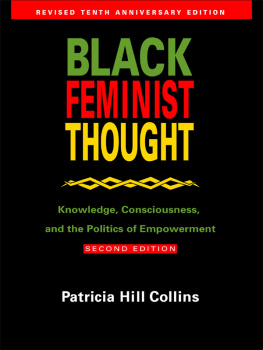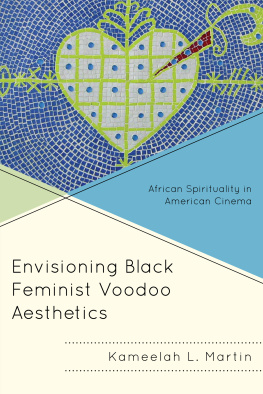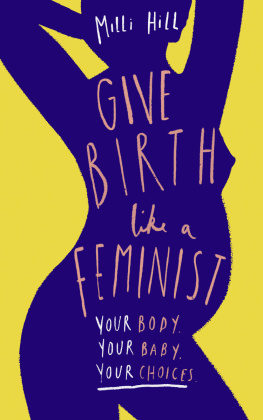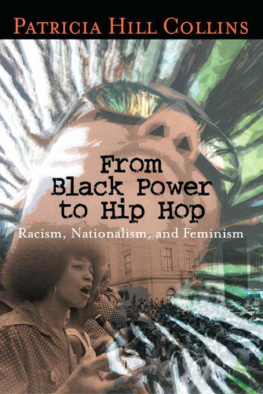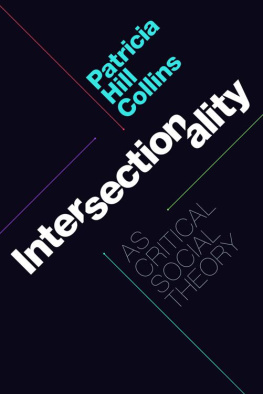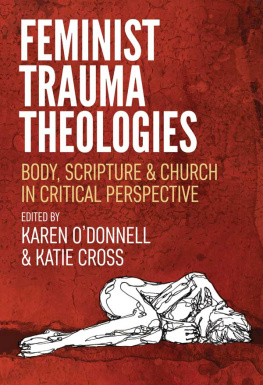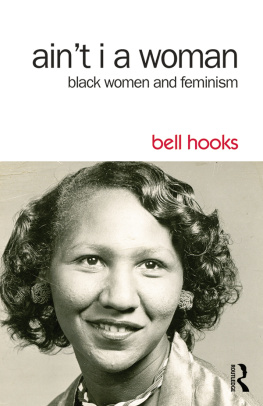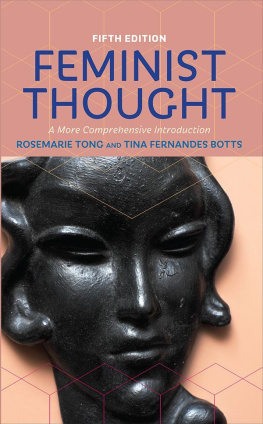Praise for the first edition of
Black Feminist Thought
The book argues convincingly that black feminists be given, in the words immortalized by Aretha Franklin, a little more R-E-S-P-E-C-T. Those with an appetite for scholarese will find the book delicious.
Black Enterprise
With the publication of Black Feminist Thought, black feminism has moved to a new level. Collins work sets a standard for the discussion of black womens lives, experiences, and thought that demands rigorous attention to the complexity of these experiences and an exploration of a multiplicity of responses.
Womens Review of Books
Patricia Hill Collins new work [is] a marvelous and engaging account of the social construction of black feminist thought. Historically grounded, making excellent use of oral history, interviews, music, poetry, fiction, and scholarly literature, Hill proposes to illuminate black womens standpoint. Those already familiar with black womens history and literature will find this book a rich and satisfying analysis. Those who are not well acquainted with this body of work will find Collins book an accessible and absorbing first encounter with excerpts from many works, inviting fuller engagement. As an overview, this book would make an excellent text in womens studies, ethnic studies, and African-American studies courses, especially at the upper-division and graduate levels. As a meditation on the deeper implications of feminist epistemology and sociological practice, Patricia Hill Collins has given us a particular gift.
Signs
Patricia Hill Collins has done the impossible. She has written a book on black feminist thought that combines the theory with the most immediate in feminist practice. Collins book is a must for any feminists library.
Rosemarie Tong
Finding her own voice and sharing with us the voices of other African-American women, Collins brilliantly explicates our unique standpoint. As a black feminist, Collins traverses both old and new territories. She explores the familiar themes of oppression, family, work, and activism and also examines new areas of cultural images and sexual politics. Collins gently challenges white feminist dominance of feminist theory and nurtures an appreciation for diversity in positions reflecting different race, class, and gender junctures. Her work is an example of how academics can make their work accessible to the wider public.
Elizabeth Higginbotham, Professor of Sociology, University of Delaware, and co-editor of Women and Work: Exploring Race, Ethnicity, and Class (Volume 6)
REVISED TENTH ANNIVERSARY EDITION
BLACK
FEMINIST
THOUGHT

Knowledge,
Consciousness,
and the
Politics of
Empowerment
Second Edition

Patricia Hill Collins

Published in 2000 by
Routledge
Published 2014 by Routledge
2 Park Square, Milton Park, Abingdon, Oxon OX14 4RN
711 Third Avenue, New York, NY 10017, USA
This edition published in the Taylor & Francis e-Library, 2002.
Copyright 2000 by Routledge
Routledge is an imprint of the Taylor & Francis Group, an informa business
All rights reserved. No part of this book may be reprinted or reproduced or utilized in any form or by any electronic, mechanical or other means, now known or hereafter invented, including photocopying and recording or in any information storage or retrieval system, without permission in writing from the publishers.
Library of Congress Cataloging-in-Publication Data
Collins, Patricia Hill, 1948
Black feminist thought : knowledge, consciousness, and the politics of empowerment / Patricia Hill Collins. 2nd ed.
p. cm. (Perspectives on gender)
Includes bibliographical references and index.
ISBN 978-0-415-92483-2 (hbk). ISBN 978-0-415-92484-9 (pbk)
1. FeminismUnited States. 2. Afro-American women. 3. United
StatesRace relations. I. Title II. Series: Perspectives on
gender (New York, N.Y.)
HQ1426.C633 1999
ISBN 978-0-203-90005-5 Master e-book ISBN
ISBN 978-0-203-90009-3 (Glassbook Format)
CONTENTS

Part 1:
The Social Construction of Black Feminist Thought
Part 2:
Core Themes in Black Feminist Thought
Part 3:
Black Feminism, Knowledge, and Power
Preface
to
First
Edition

W hen I was five years old, I was chosen to play Spring in my preschool pageant. Sitting on my throne, I proudly presided over a court of children portraying birds, flowers, and the other, lesser seasons. Being surrounded by children like myselfthe daughters and sons of laborers, domestic workers, secretaries, and factory workersaffirmed who I was. When my turn came to speak, I delivered my few lines masterfully, with great enthusiasm and energy. I loved my part because I was Spring, the season of new life and hope. All of the grown-ups told me how vital my part was and congratulated me on how well I had done. Their words and hugs made me feel that I was important and that what I thought, and felt, and accomplished mattered.
As my world expanded, I learned that not everyone agreed with them. Beginning in adolescence, I was increasingly the first, or one of the few, or the only African-American and/or woman and/or working-class person in my schools, communities, and work settings. I saw nothing wrong with being who I was, but apparently many others did. My world grew larger, but I felt I was growing smaller. I tried to disappear into myself in order to deflect the painful, daily assaults designed to teach me that being an African-American, working-class woman made me lesser than those who were not. And as I felt smaller, I became quieter and eventually was virtually silenced.
This book reflects one stage in my ongoing struggle to regain my voice. Over the years I have tried to replace the external definitions of my life forwarded by dominant groups with my own self-defined viewpoint. But while my personal odyssey forms the catalyst for this volume, I now know that my experiences are far from unique. Like African-American women, many others who occupy soci-etally denigrated categories have been similarly silenced. So the voice that I now seek is both individual and collective, personal and political, one reflecting the intersection of my unique biography with the larger meaning of my historical times.
I share this part of the context that stimulated this book because that context influenced my choices concerning the volume itself. First, I was committed to making this book intellectually rigorous, well researched, and accessible to more than the select few fortunate enough to receive elite educations. I could not write a book about Black womens ideas that the vast majority of African-American women could not read and understand. Theory of all types is often presented as being so abstract that it can be appreciated only by a select few. Though often highly satisfying to academics, this definition excludes those who do not speak the language of elites and thus reinforces social relations of domination. Educated elites typically claim that only they are qualified to produce theory and believe that only they can interpret not only their own but everyone elses experiences. Moreover, educated elites often use this belief to uphold their own privilege.
Next page
